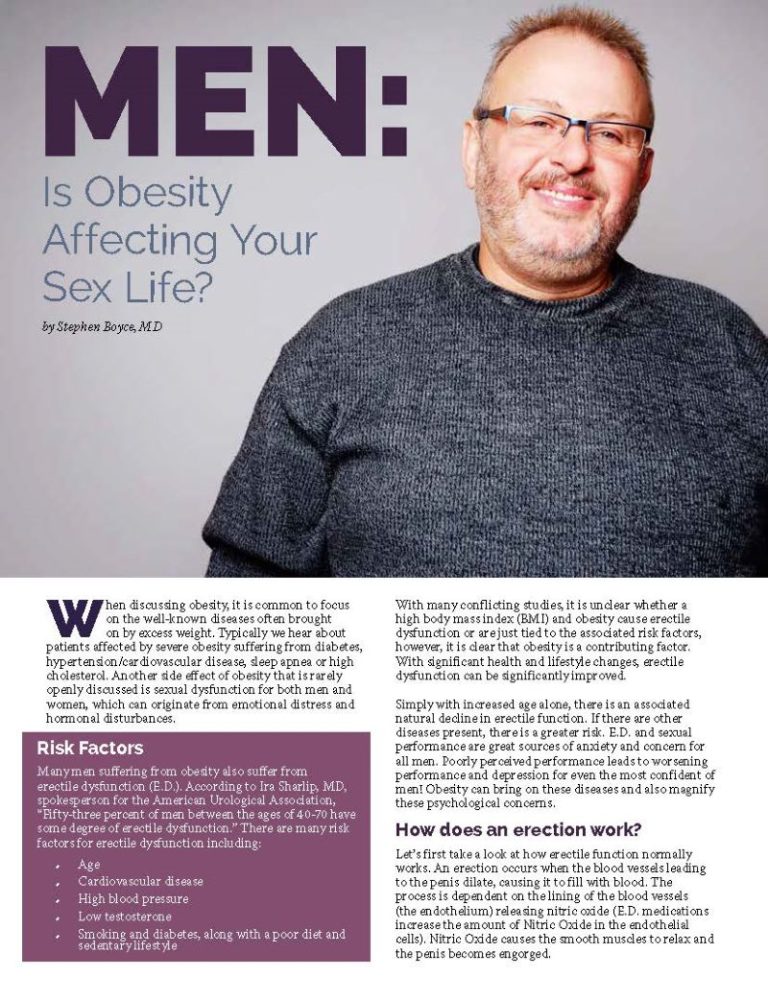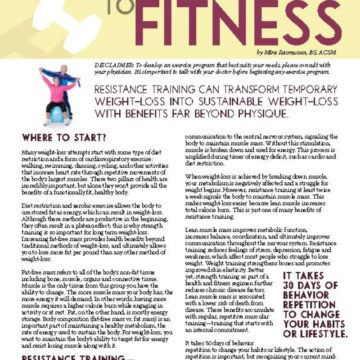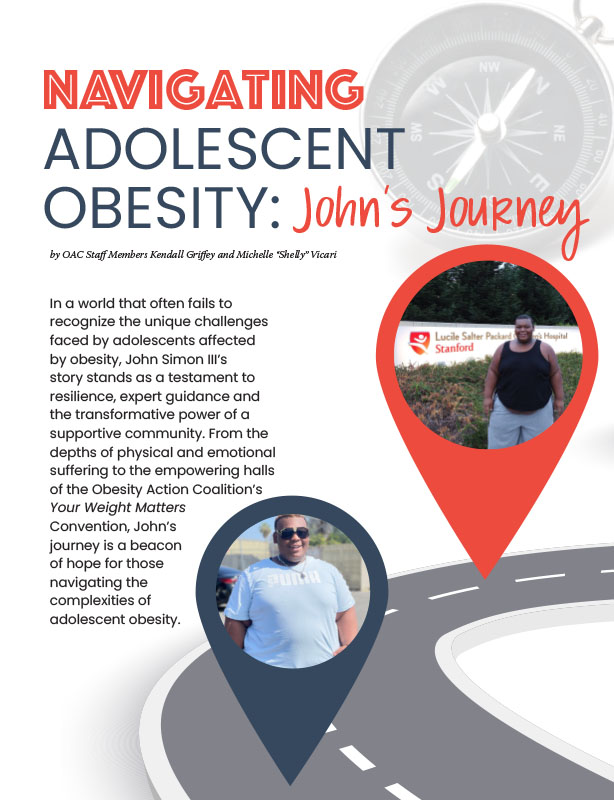Men: Is Obesity Affecting Your Sex Life?


by Stephen Boyce, MD
Summer 2014
When discussing obesity, it is common to focus on the well-known diseases often brought on by excess weight. Typically we hear about patients affected by severe obesity suffering from diabetes, hypertension/cardiovascular disease, sleep apnea or high cholesterol. Another side effect of obesity that is rarely openly discussed is sexual dysfunction for both men and women, which can originate from emotional distress and hormonal disturbances.
Risk Factors
Many men suffering from obesity also suffer from erectile dysfunction (E.D.). According to Ira Sharlip, MD, spokesperson for the American Urological Association, “Fifty-three percent of men between the ages of 40-70 have some degree of erectile dysfunction.” There are many risk factors for erectile dysfunction including:
- Age
- Cardiovascular disease
- High blood pressure
- Low testosterone
- Smoking and diabetes, along with a poor diet and sedentary lifestyle
With many conflicting studies, it is unclear whether a high body mass index (BMI) and obesity cause erectile dysfunction or are just tied to the associated risk factors, however, it is clear that obesity is a contributing factor. With significant health and lifestyle changes, erectile dysfunction can be significantly improved.
Simply with increased age alone, there is an associated natural decline in erectile function. If there are other diseases present, there is a greater risk. E.D. and sexual performance are great sources of anxiety and concern for all men. Poorly perceived performance leads to worsening performance and depression for even the most confident of men! Obesity can bring on these diseases and also magnify these psychological concerns.
How does an erection work?
Let’s first take a look at how erectile function normally works. An erection occurs when the blood vessels leading to the penis dilate, causing it to fill with blood. The process is dependent on the lining of the blood vessels (the endothelium) releasing nitric oxide (E.D. medications increase the amount of Nitric Oxide in the endothelial cells). Nitric Oxide causes the smooth muscles to relax and the penis becomes engorged.
Anything that damages the blood vessels can potentially interfere with this process resulting in E.D. So the same things that cause heart disease and stroke, can cause E.D.
Obesity and E.D.
Overweight/obesity can cause E.D. by damaging the blood vessels, decreasing testosterone and causing a state of generalized inflammation in the body. Obesity can cause damage to blood vessels due to the associated hypertension, diabetes mellitus, hypercholesterolemia, hypertriglyceridemia and inflammation.
It is proposed that the increased state of inflammation may cause free radicals in the body that cause oxidative damage to tissues. The harmful effects of hypertension, diabetes and hyperlipidemia are well studied, published and accepted. Men who are affected by obesity may have elevated cholesterol, hypertension and high blood pressure and diabetes, all of which contribute to erectile dysfunction. “If you are affected by obesity, the risk of developing diabetes is two to three times more likely than for someone who is not affected by obesity,” says Elizabeth Selvin, PhD, MPH, assistant professor and epidemiologist at John Hopkins Bloomberg School of Public Health. Additionally, she says, “More than 50 percent of men with diabetes suffer from erectile dysfunction.”
It is well studied and accepted that obesity often leads to diabetes as well as atherosclerosis-related hypertension and cardiovascular disease, which can cause E.D. We do not know exactly why, but obesity appears to damage the inner lining of the vessels (the endothelium) and when this lining is damaged the penis cannot get enough blood flow to produce and sustain an erection. “An erection is basically a cardiovascular event, and if blood flow cannot increase because the blood vessels can’t dilate normally, then there is a decrease in erectile function,” says Robert A Kloner, MD, a cardiologist and professor of medicine at the University of Southern California’s Keck School of Medicine. A fatty diet and lack of exercise that contribute to obesity and cardiovascular disease can cause narrowing and hardening of the arteries (atherosclerosis), which can slow blood flow as well.
Another common risk factor for E.D. is low levels of testosterone, which is also linked to obesity. Appropriate levels of this hormone are necessary to achieve erections and maintain a healthy sex drive. When the patient has a large amount of belly fat, there is a greater affect on the testosterone levels. In males, abdominal fat will convert testosterone to estrogen interfering with proper hormonal balance. Testosterone levels may not be affected quickly and directly by weight-loss, so there may be a need for additional testosterone to be prescribed in the form of a gel, injections or patches.
The Good News
Research tells us that erectile function can be improved by making specific lifestyle changes! If you are affected by obesity, a BMI greater than 30, you are allowing yourself to be at greater risk for diabetes, high blood pressure, hypertension, cardiovascular disease and for men, erectile dysfunction. Eating healthy, exercising and not smoking can absolutely correct E.D. in many cases!
Men who lose weight have improved erectile function and improved sexual experiences along with improved overall health. Becoming more active and implementing exercise daily will reduce your risk and can prevent E.D. Research tells us that losing only 10 percent of body weight throughout a two month period will improve erectile function.
“Nobody said that it would be easy. They just promised it would be worth it!”
Now, I know that losing weight is not an easy thing to do. Many of you have struggled with your weight for your entire life. You may have tried every diet known to man and still suffer from obesity. You have to start where you are and seek help. Reach out to an accredited medically supervised weight-loss program and utilize their multidisciplinary team to create a program designed for you.
Perhaps it is time to consider consulting a physician or a surgeon to go over all your obesity treatment options. There are so many more surgical and non-surgical options available today than ever before that can help you begin your weight-loss journey.
One thing that is for sure, being sexually active and fulfilled is necessary for a happy, healthy life. If you are suffering from erectile dysfunction, seek help from a medical professional. Find out if you have any of the diseases that are associated with causing E.D. and seek treatment. If you are suffering from obesity and E.D., make a decision today to treat your disease of obesity with a plan of action. Get your mojo back! Begin to eat right and commit to move more each day. I challenge you to begin the journey to your New Life!
About the Author:
Stephen Boyce, MD, obtained his Bachelor of Science and Masters of Science from Texas A&M University, College Station, before beginning medical school in Dallas, Texas at the University of Texas Southwestern Medical School where he received his medical degree. Surgical Residency was performed at Parkland Memorial Hospital in Dallas where he completed his general surgery training. With more than 24 years of experience performing bariatric surgeries, Dr. Boyce has completed more than 4,000 bariatric surgical procedures, has special training in advanced laparoscopic surgery and has also completed a Masters Certification in Bariatric Surgery. He started his own practice the New Life Center for Bariatric Surgery in Knoxville, Tenn. in 2002, which shortly after became one of the Nation’s first Centers of Excellence (7th in the Nation) in 2005. His special interest in bariatric nutrition led him to develop Bari Life Bariatric Supplements, specializing in custom multivitamin formulas for the bariatric surgery patient. Additionally, he is an active educator for Ethicon-Endo Surgery and he was the first physician to be awarded the Obesity Action Coalition (OAC), “Outstanding Membership Recruitment by a Physician” Award.
by Nina Crowley, PhD, RD (with Inspiration from Shawn Cochran) Winter 2024 Dating, no matter your age,…
Read Articleby Leslie M. Golden, MD, MPH, ABOM Diplomate Winter 2024 The journey to overcoming obesity is a…
Read Articleby OAC Staff Members Kendall Griffey and Michelle “Shelly” Vicari Winter 2024 In a world that often…
Read Article








